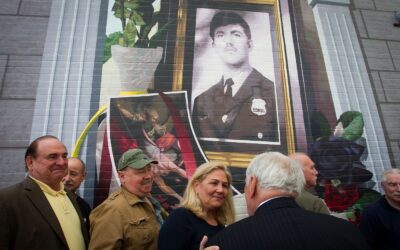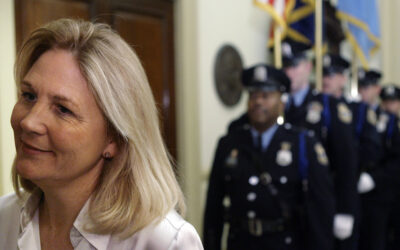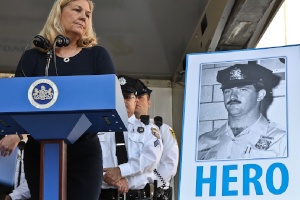Myth # 4
Myths About Mumia
Mumia Abu-Jamal is a “political prisoner,” who received his death sentence, because of his political ideology. The basis for this argument, according to Jamal and his attorneys, is the fact that prosecutor Joe McGill, brought up Jamal’s political beliefs and his prior membership in the Black Panther Party, in front of the jury.
BRIEF REBUTTAL
Mumia Abu-Jamal was sentenced to death by a jury that heard the monumental amount of evidence pointing to his guilt as a remorseless murderer. It was Mumia Abu-Jamal, not the judge or the prosecutor, who openly and frequently chose to proclaim his political ideology before the jury. The record verifies that there was not a single occasion during the trial in which any reference to Jamal’s political ideology was made by the prosecutor or the judge. It was not until the sentencing phase of the trial, after Jamal had already been convicted, that prosecutor Joe McGill addressed, for the first and only time, what Jamal chooses to describe as statements of his “political ideology.” In response to character witnesses who said that Jamal was a “peaceful man” and that violence was alien to his nature, the prosecutor asked Jamal if he had written that “All political power grows from the barrel of a gun.” The prosecutor’s questions went to Jamal’s violent nature, not his political ideology.
It is clear to anyone who reads the trial record that the basis for Jamal’s sentence was not his politics. Mumia Abu-Jamal was sentenced to death for a violent, cowardly and premeditated act of murder.
FACTS SUPPORTING OUR REBUTTAL
The record reveals that, from the first day of jury selection and throughout the trial, it was Mumia Abu-Jamal, not prosecutor Joe McGill, who, in full view of the jury, attempted to politicize his trial by making the courtroom a forum for his political ideology. Virtually every day of the 1982 trial, Jamal demanded to be “represented by” John Africa, the leader of a violent anti-government group called Move. (In a previous highly publicized trial, several Move members had been convicted of murdering another police officer, James Ramp, in 1978.)
In 1982, Move was an organization that was well known throughout Philadelphia for its violent clashes with its neighbors and the police, and for its civil disruptions. Wearing their distinctive dreadlock hairstyle, dozens of Move members crowded the 1982 courtroom, taking every opportunity to disrupt the trial proceedings. The Move members that attended the 1982 trial — many of whom would later die in the 1985 Osage Avenue conflagration — refused to stand when the judge entered the courtroom. When forced to do so, under threat of removal, they stood with their backs turned to the judge, or thrust their arms out in a Nazi salute. Several Move members were involved in fistfights in the courtroom, and regularly shouted out insults at the judge and at witnesses. Additionally, the record reflects that several Move members were used as “legal runners” by Jamal, often conferring with him at the defense table. All of this was done in full view of the jury.
Mumia Abu-Jamal’s incessant demands to have John Africa, the leader of this group, “represent” him, was a clear statement to the jury of his political affiliation with Move. With repeated loud outbursts in the courtroom, in full view of the jury, Jamal openly fought with the judge, questioned the authority of the U.S. legal system to try him, insulted the prosecutor and openly ridiculed his own handpicked defense attorney. It’s not hard to imagine the negative impact these voluntary actions by Jamal and his friends had on the jury.
In the transcripts we find that Jamal informs the court that he doesn’t care what the jury hears, and that he will interrupt the proceedings again and again, as he sees fit, until John Africa is permitted to represent him. He further states that he is “defending himself in the style of John Africa,” who advised constant courtroom disruption (as was done in the 1979 MOVE trial) in order to disrupt the flow of the proceeding and gain the jury’s sympathy.
Court: “You realize if you interrupt in front of this jury, I’m going to have to remove you again.”
Defendant: “Judge, you can remove me again and again and again and again and again and again. I’m going to point out to you what is important to me; that this is my trial; that this man [Mr. Jackson] is your employee, not mine; that he is functioning for the court system, not for me; he is not doing what I am telling him and directing him to do but what you are ordering him to do. So I choose to sit down because you can hear me from the seat.”
Court: “Okay.”
Defendant: “And I would like to have John Africa appointed to assist me in this matter.”
Court: “Denied.”
Defendant: “Judge, you can call the jury in and I don’t care if they hear it, frankly, because it’s the truth.”
N.T. 6/24/82, 85
There are dozens of examples of Jamal’s demands to be “represented by” John Africa, these are just a few:
Defendant: “I’m attempting to get counsel of my choice. I’m attempting to get John Africa.”
Court: “I’m telling you Mr. Jamal, if you disrupt the proceedings, I’m warning you –“
Defendant: “Judge, your warning means nothing to me. Do you understand that?”
Court: “And I’m telling you, you may very well be removed as counsel.”
Defendant: “You do whatever you have to do.”
Court: “And Mr. Jackson will be put in.”
Defendant: “Do whatever. It’s not your choice, not his choice or Jackson’s choice. I want my own counsel of my choice, someone I have faith in, someone –“
McGill: “Is that John Africa he’s talking about?”
Court: “Yes, John Africa he’s talking about.”
Defendant: “That’s right. You have not ruled to my satisfaction. This is my trial.”
Court: “I don’t care about your satisfaction.”
Defendant: “Listen I do –“
Court: “There’s satisfaction –“
Defendant: “I do.”
Court: “– in Appellate Court.”
N.T. 6/17/82, 1.50-1
Defendant: “I would like to have John Africa Represent me.”
Court: “I know. It’s there in the record numerous times. You don’t have to put it in again. Will you please sit down so we can proceed with the trial?” (6-23-82, T.R. 6.118)
Defendant: “Judge, I am asking the question in the spirit of the proceeding. Obviously I’m not obstructing anything.”
Court: “Yes, you are.”
Defendant: “Again, I am not.”
Court: “Yes, you are.”
Defendant: “I would like to protest the continued presence of Mr. Jackson as my defense. He is not my counsel. My counsel is John Africa.”
N.T. 6/24/82, 19
After being convicted of First Degree Murder, Jamal chose of his own free will, and against his own attorney’s recommendation, to read a rambling political statement to the jury that was to sentence him. In this statement Jamal called Judge Albert Sabo a “Black Robed Conspirator” (N.T. 7/3/82, 11). It was Jamal, not prosecutor Joe McGill as the defense contends, who first brought up the issue of Jamal’s political affiliations. Jamal freely chose to make his political beliefs crystal clear to the jury when he quoted John Africa in his statement to them:
“It is the system that is guilty of the crimes of all that is criminal, all crimes are committed within the system not without…”
N.T. 7/3/82, 14
In a final proclamation of his political affiliation with MOVE, Jamal had this to say to the jury that was about to sentence him:
“This decision today proves neither my guilt nor my innocence. It proves merely that the system is finished. Babylon is falling. Long Live Move. Long Live John Africa.”
N.T. 7/3/82, 16
Those who argue that it was the prosecutor who first brought up Jamal’s political beliefs simply choose to ignore the record and Jamal’s own words. Contrary to what Jamal’s supporters contend, from the outset of the trial it was Jamal’s plan to make the jury aware of his political beliefs in an attempt to transform himself into a victim of an allegedly corrupt legal system, and to make his trial a political referendum on Move.
QUESTIONS ABOUT JAMAL’S
BLACK PANTHER PAST
It is often argued by Jamal’s supporters that prosecutor Joe McGill violated Jamal’s civil rights when, during the sentencing phase of the trial, McGill asked Jamal about his personal philosophy on violence. While doing so, McGill questioned Jamal about quotes he had made as a young “Panther” in a 1972 newspaper article. Jamal’s attorneys argue that this line of questioning violated Jamal’s First Amendment rights and that he has been “sentenced to death by free speech.” The basis for their argument is a 1992 case, called Dawson vs. Delaware. Jamal’s attorneys twist the significance of “Dawson” to argue that Dawson’s conviction was overturned on appeal, because the prosecutor in that case had improperly introduced Dawson’s affiliation with this prison gang (The Aryan Brotherhood) that was known to be racist, violent and a white supremacist organization. They contend that McGill’s questioning of Jamal regarding his Black Panther past was a situation identical to the “Dawson” case, and therefore, Jamal’s conviction should be overturned.
WHAT REALLY HAPPENED DURING
THE SENTENCING PHASE?
The trial record clearly shows that after Jamal had been “sworn in” by the court he chose to express his political philosophy to the jury in the lengthy statement he read to them. Subsequently, in order to attack the notion that violence was alien to Jamal’s nature, Assistant DA Joe McGill questioned Mumia Abu-Jamal about various political quotes he had made in the past. In particular, McGill focused on a quote Jamal had offered in a newspaper interview, when he was a young Black Panther. In that interview, Jamal had stated, “All political power grows out of the barrel of a gun.” While questioning Jamal in 1982, McGill asked Jamal several times, if he still subscribed to this philosophy. Jamal danced around the question, stating that history had proved this philosophy to be true, loosely affirming his continued belief in Mao’s statement. He also stated that the Panthers would take “whatever actions where necessary,” to respond to perceived police and government oppression.
Jamal’s lawyers now argue that this line of questioning violated Jamal’s civil rights. But in fact, such questioning was permissible and appropriate in light of earlier testimony given by Jamal’s character witnesses, in which they stated that he “was a peaceful man” Responding to the “barrel of a gun” quote and the philosophy it represents, it was Jamal, not the prosecutor, who highlighted his past membership in the Black Panther Party.
WHAT THE 7 MEMBERS OF
THE SUPREME COURT FOUND
The Pennsylvania Supreme Court first considered Jamal’s allegation on Direct Appeal in 1989, and found it to be without merit. Dawson vs. Delaware was then decided in 1992. Based on that case, Jamal’s attorneys again raised the same issue in their 1995 PCRA appeal. In response, the 7 members of the Pennsylvania State Supreme Court unanimously found that this argument still held no legal water, stating,
“In Dawson, the state, in order to rebut mitigating character evidence adduced by the defendant, introduced evidence that the defendant was a member of the Aryan Brotherhood prison gang. This evidence was introduced via stipulation, which proved only that an Aryan Brotherhood prison gang which entertains white racists beliefs, originated in California in the 1960’s and that a separate gang in Delaware prison system calls itself the Aryan Brotherhood. The Court noted that had the prosecution offered the evidence it initially claimed it had, which would demonstrate that this is a white racist gang associated with drugs and violent escape attempts at prison, and that this gang advocates the murder of fellow inmates, the Court would likely have found no error in admitting evidence of the defendant’s membership in that gang, since the violent nature of that gang would be relevant to rebut evidence of the defendant’s good character. In other words, the Court made it clear that the admission of such affiliations of a defendant is proper only where there is evidence of the demonstrating some connection between that affiliation and the character evidence sought to be rebutted. In the instant case, [Jamal’s case] Appellant’s own quotes in the newspaper article evidence that the Philadelphia chapter of the Black Panther Party, to which Appellant belonged, would use violence if necessary to quell, what the Party perceived to be rampant police brutality against Party members. Accordingly, the nature of the Party was amply demonstrated and the requisite connection between membership in the Black Panther Party and the character evidence presented by Appellant, specifically, that he was a peaceful and genial man, was met. Thus, this issue has been finally litigated and warrants no further review, even in light of the subsequent decision in Dawson.”
(Pennsylvania Supreme Court, Opinion of the Court, 1998)
WAS JAMAL A “PEACEFUL AND GENTLE MAN”
AS HE IS CHARACTERIZED?
Though Jamal had no criminal record on the morning he was arrested, there is ample evidence to show that he was not, by nature, a “peaceful man,” as he is portrayed by his followers. In a recent biography written about his life and in his own extensive writings, Mumia Abu-Jamal freely admits to his deep-seated hatred for police officers and for the government. As a Black Panther, Jamal wrote of his desire to kill police officers, stating, “I for one feel like putting down my pen. Let’s write epitaphs for Pigs!” (The Black Panther, 4/18/70, 12). Is this the rhetoric of a “peaceful man”? On July 1979, Jamal purchased, and registered, a five shot revolver and loaded it with “devastating” high-powered special +P ammunition. Is this the action of a man to whom violence is “alien”? On December 9, 1981, Mumia Abu-Jamal finally acted out what he had been writing and speaking about for years. He pulled his gun and executed Officer Faulkner as he lay wounded and unarmed on the sidewalk.
Several months after his conviction for this act, at the sentencing hearing, Jamal again contradicted his allegedly “peaceful” nature when he threatened Judge Albert Sabo in the courtroom, saying:
“You have just been sentenced to death.”
N.T. 5/25/83, 165
CONCLUSION
The facts show that prosecutor Joe McGill’s questions about Jamal’s attitude toward violence, based on his own past actions and statements, were entirely proper. Jamal’s cynical attempt to portray his own violent assertions as “free speech” misses the point. Jamal was free to express, and did express, his hatred of the police and his love of violence as often as he liked. But when he killed a police officer and claimed to the jury that he was a gentle, peace-loving man, he was not entitled to hide what he had said, the better to trick the jurors. It was Jamal, moreover, who tried to make his political views, especially his Move connection, an issue in the trial.
Latest News
Abu-Jamal Moved to Prison Northwest of Philly Convicted killer moved to medium-security prison
Convicted killer moved to medium-security prison Former death row inmate Mumia Abu-Jamal has been transferred from a maximum-security prison in...
Decision on Mumia Abu-Jamal Sentence
Philadelphia—The District Attorney’s Office has decided after long and careful consideration, as well as consultation with the family of Officer...
The Pulse: After husband is murdered, 30 long years of phone calls
In California last Tuesday, Maureen Faulkner's telephone began ringing at 6:30 a.m. When she looked down and saw the instant onslaught of calls from...
NEVER FORGET DANIEL FAULKNER
Without the support of Justice for Police Officer Daniel Faulkner, the Faulkner family – and specifically Maureen – could not afford to keep up the vigilant fight.


